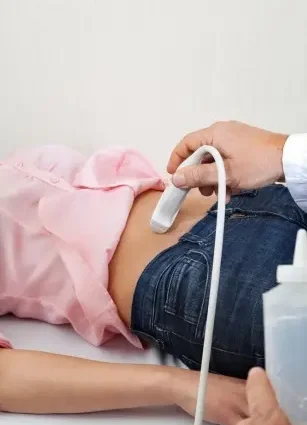
When you are pregnant, you are many times more sensitive and emotional than you might expect. You open the newspaper, turn on the TV, browse the Internet about your condition and it seems to you that pregnancy is a constant threat, danger and risk. If this was really the case, the expectant mother would not have to eat, drink, leave the house, breathe polluted air without exposing herself and her baby to constant threats. However, remember that pregnancy has never been as safe as it is today in the history of reproduction. In order to give birth to a healthy and joyful baby, you should be under prenatal care from the moment you suspect you are pregnant.
The first visit to the gynecologist during pregnancy is always the most exciting and exhausting at the same time. It is during this visit that the doctor will confirm your assumptions. It is during this visit that he will collect a detailed medical history, set up a pregnancy card and order a number of tests to be performed. For a period of nine months, you will be the most tested person. Some tests you will perform only once, others you will repeat cyclically every month. Remember one thing, they serve you above all, and in particular the little man growing inside you. They are to ensure both of you that everything is in order, and in the event of irregularities, let them act.
Confirmation of pregnancy – the doctor will ask about your last menstrual period to determine the date of delivery, ask about your pregnancy symptoms. During the gynecological examination, he will examine the cervix and take a smear for Pap smear. He will take your blood pressure, examine your breasts, record your weight and compare it at each visit. He will order you to perform the following tests: blood test to determine the group and Rh factor to control possible anemia (hemoglobin level) and detect serological conflict (to be able to give antibodies protecting against complications), general urine test for the content of sugar, protein, white and red blood cells and bacteria. Testing for antibodies to toxoplasmosis, which, if not detected, may threaten your baby. He will also order tests for the presence of infections: HIV, venereal diseases, chlamydia. You will also need to do a blood sugar test for gestational diabetes.
You will visit your doctor every five weeks, at each visit the doctor will analyze your results, perform genital palpation, pelvic examination. In the first trimester, the doctor will perform an ultrasound scan – you will be able to watch your baby. This test will allow you to determine the expected date of delivery, it will give you the opportunity to assess the heart function, the condition of the placenta and the chorion, and at a later date will allow you to find out the baby’s sex. At the end of pregnancy, the doctor will assess the position and size of the baby, the amount of amniotic fluid and the condition of the placenta. This will allow you to feel safe and not worry about an uncertain future. Between weeks 21 and 24 of your pregnancy, you will need to perform a fasting glucose test, which is not the mother’s favorite test. Then drink the specified dose of dissolved glucose in water and the result will be determined after 1 to 2 hours. This allows you to detect gestational diabetes so that you can introduce the necessary diet. A very important test is the HBs test for hepatitis B carriers. If the result is positive soon after birth, your baby will receive an injection of immunoglobulin to prevent infection.
Pregnancy is a waiting time that requires a lot of patience, self-discipline and time management from you. If you plan everything carefully, follow the dates of visits and doctor’s recommendations, and perform tests, you can be sure that you have done everything in your power to ensure that your baby is born healthy.










